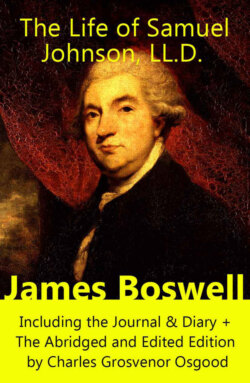Читать книгу The Life of Samuel Johnson, LL.D. - James Boswell - Страница 45
На сайте Литреса книга снята с продажи.
‘GOWER.
Оглавление‘Trentham, Aug. 1, 1739.’
[Page 134: Johnson’s wish to practise law. A.D. 1738.]
It was, perhaps, no small disappointment to Johnson that this respectable application had not the desired effect; yet how much reason has there been, both for himself and his country, to rejoice that it did not succeed, as he might probably have wasted in obscurity those hours in which he afterwards produced his incomparable works.
About this time he made one other effort to emancipate himself from the drudgery of authourship. He applied to Dr. Adams, to consult Dr. Smalbroke of the Commons, whether a person might be permitted to practice as an advocate there, without a doctor’s degree in Civil Law. ‘I am (said he) a total stranger to these studies; but whatever is a profession, and maintains numbers, must be within the reach of common abilities, and some degree of industry.’ Dr. Adams was much pleased with Johnson’s design to employ his talents in that manner, being confident he would have attained to great eminence. And, indeed, I cannot conceive a man better qualified to make a distinguished figure as a lawyer; for, he would have brought to his profession a rich store of various knowledge, an uncommon acuteness, and a command of language, in which few could have equalled, and none have surpassed him[379]. He who could display eloquence and wit in defence of the decision of the House of Commons upon Mr. Wilkes’s election for Middlesex[380], and of the unconstitutional taxation of our fellow-subjects in America[381], must have been a powerful advocate in any cause. But here, also, the want of a degree was an insurmountable bar.
[Page 135: Paul Sarpi’s History. Ætat 29.]
He was, therefore, under the necessity of persevering in that course, into which he had been forced; and we find, that his proposal from Greenwich to Mr. Cave, for a translation of Father Paul Sarpi’s History, was accepted[382].
Some sheets of this translation were printed off, but the design was dropt; for it happened, oddly enough, that another person of the name of Samuel Johnson, Librarian of St. Martin’s in the Fields, and Curate of that parish, engaged in the same undertaking, and was patronised by the Clergy, particularly by Dr. Pearce, afterwards Bishop of Rochester. Several light skirmishes passed between the rival translators, in the newspapers of the day; and the consequence was, that they destroyed each other, for neither of them went on with the work. It is much to be regretted, that the able performance of that celebrated genius FRA PAOLO, lost the advantage of being incorporated into British literature by the masterly hand of Johnson.
[Page 136: Mr. Cave’s insinuation. A.D. 1738.]
I have in my possession, by the favour of Mr. John Nichols, a paper in Johnson’s handwriting, entitled ‘Account between Mr. Edward Cave and Sam. Johnson, in relation to a version of Father Paul, &c. begun August the 2d, 1738; ‘by which it appears, that from that day to the 21st of April, 1739, Johnson received for this work, £49 7_s_. in sums of one, two, three, and sometimes four guineas at a time, most frequently two. And it is curious to observe the minute and scrupulous accuracy with which Johnson has pasted upon it a slip of paper, which he has entitled Small Account,’ and which contains one article, ‘Sept. 9th, Mr. Cave laid down 2s. 6d.’ There is subjoined to this account, a list of some subscribers to the work, partly in Johnson’s handwriting, partly in that of another person; and there follows a leaf or two on which are written a number of characters which have the appearance of a short hand, which, perhaps, Johnson was then trying to learn.
‘To MR. CAVE.
‘Wednesday.
